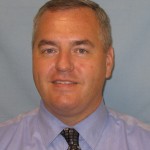Telecommunicator Spotlight: Michael Slater
Throughout the duration of his 30-year career in police dispatching, there’s little that Michael Slater has not seen, heard or experienced. Slater, 48, serves as a state police dispatcher III and supervisor of the dispatch center for the Massachusetts State Police. Originally from Somerville, Mass., he began his career as a clerk in the Firearms Records Bureau (FRB), where he worked for three years before transitioning into dispatching.
Slater served as a line dispatcher from 1986-1999 and became a dispatcher supervisor II in 1999. As a line dispatcher, he enjoyed the interaction with the troopers on the road. What he found especially interesting was when he would get a name and then go on what he described as a “fishing expedition” to find necessary information about the individual. Slater also enjoyed the legwork involved in running people’s names and determining if there were outstanding warrants or other pertinent information.
Slater recalled the days, prior to 1992, when his dispatch center had no record system for 9-1-1 calls; instead the calls had to be answered by a handset on a desk and he had to rely on what people were saying. Moreover, he couldn’t replay the calls. However, after 1992 additional equipment was obtained and, consequently, a full-blown 9-1-1 system evolved.
Domestic violence calls can be particularly stressful. He recalled keeping a caller on the line when the two parties were in a vehicle and engaged in an incident.
Slater notes that an individual can make a career out of dispatching and, in Massachusetts, the pay is good. He says the career can be rewarding, and there can be both highs and lows. Slater stressed the fact it is important that candidates for the job be sure of their goals. They have to be prepared for stress and pressure. “That pressure can be overwhelming at times,” Slater says.
Slater explains that when there is a job opening, as many as 200 resumes can flow in. He sorts through them and looks for resumes that reflect experience with public safety dispatching and knowledge of computer systems; he focuses on people who appear interested in making a career out of the job. During the interview process, Slater asks hypothetical questions to ascertain how the job candidate reasons through a situation and offers solutions. He also wants to know where the candidate foresees being in a career within the next five years.
A seasoned professional, Slater worked during the Boston Marathon bombing. It was the end of his shift and, “I was just getting ready to walk out the door,” Slater says. The first moment they knew anything was wrong was when the explosions occurred at the finish line of the 26.2 mile course. “We didn’t know the extent of what we had,” Slater says. However, the mode of mass-casualty incident was implemented.
There are four barracks in the Boston area, and personnel were also brought in from outlying areas. “It was a bit overwhelming initially,” Slater says. However, a joint command post was set up, there was a call-out for explosive/bomb detecting K9 units, and federal backup came in from Rhode Island. “It was quite the night. The whole week seemed like one long day,” Slater says. The Boston police, state police and the FBI set up a joint command post at Logan Airport. “I had dispatchers everywhere. It was kind of surreal,” Slater says.
Following the marathon incident and its aftermath, the dispatchers were offered stress debriefing. Slater and his supervisor were the only ones to show up for it. One dispatcher commented that this is what they are trained to do and that is what they are here for and, consequently, didn’t feel a need to be debriefed. However, Slater felt the debriefing helped him, and it evolved into a meeting about dealing with stressful incidents.
Slater has handled other stressful situations. One of the most difficult situations he handled was in Framingham, Mass., in the mid-90s. He had just arrived at work to take calls when he got a call from Cambridge indicating the state police helicopter went down shortly after takeoff and had crashed into a house. Making the call even more difficult was the fact that he knew the two pilots. The crash was quickly on the news and shortly thereafter one of the trooper’s wives called. Slater had to keep her on the phone while someone was en route to her house. “That was a bad, bad day,” Slater says.
When he is not working, Slater enjoys wood working, reading and travel. He has received the state government Pride and Performance Award twice and also received the group Manuel Carballo Governor’s Award.
Looking back on his career, Slater is reflective. “It can be very difficult, and it can be very rewarding. I find what I’ve done with my life to be meaningful. It’s been a rewarding experience,” he says.
About the Author
Karen L. Bune serves as an adjunct professor at George Mason University and Marymount University in Virginia, and is a consultant for the Training and Technical Assistance Center for the Office for Victims of Crime and the Office of Juvenile Justice and Delinquency Prevention, U.S. Department of Justice. She is a nationally recognized speaker and trainer on public safety issues. Bune is board certified in Traumatic Stress and Domestic Violence, and she is a fellow of The Academy of Experts in Traumatic Stress and the National Center for Crisis Management. She serves on the Institutional Review Board of The Police Foundation, Washington, D.C.


